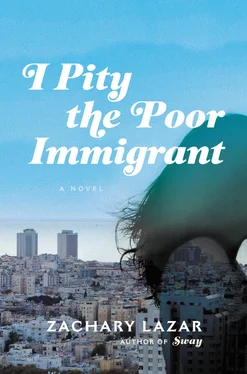But Gila was of course someone I knew. A friend of hers, she’d told me, had seen my piece on Bellen and passed it on to her — the friend, Hugh, and his partner owned the apartment where Gila was staying that night as a guest. They had a summer house near where Gila lived now, in Sag Harbor, New York. It was a strange coincidence, I pointed out — my family, as she knew, had had a house in the next town over, Southampton. As she also knew, it was during a stay at that house that my father had first told me of their affair.
Her clothes looked expensive — pearl-gray slacks, a simple white blouse, crisply pressed. The clothes seemed to assert that she had taste and also more money than I probably expected.
“ ‘Strange,’ ” she said, echoing my word. “Everyone always says ‘strange.’ But life is strange. My life certainly has been strange.”
She took a slow drink of water. When she put the glass down, she lightly wiped her hands, one atop the other, watching them. The cancer had been “strange,” she told me. It had started in her big toe — all her toenails turned a cloudy white — and two different doctors had assured her at first that it was nothing, until by the time anyone gave it any real thought it had metastasized all over her body.
I said I was sorry. She looked at me then with something like forbearance, a kind of suppressed disappointment. In that look, I could see a regret for all the perfectly real things that separated us. But I could also see that, having read my piece, she thought we were somehow kindred spirits. She had expected something less trite from me than “strange” and “I’m sorry.”
“I didn’t ask you here to talk about what happened with your father all that time ago,” she said then. “A lot of painful things. Obviously. And I didn’t ask you here to talk about my cancer. A lot of people get cancer. I wanted to show you something. That’s why I asked you here. This is something I thought you’d find interesting as a writer. Something that’s not just personal.”
With some difficulty, she took an old photo album out of her purse. It contained a fading collection of 5 x 7 prints that dated back to the 1970s, their colors degrading into an acidic murk behind their plastic compartments. She showed me one series in particular — I wish I had the photographs with me now — first through the plastic, then, so I could get a better look, removing the pictures from the album. They were stark interior views of an apartment, like realtor’s photos, except that these photos made no attempt to flatter the space they portrayed. The ceilings were low, the light depressingly dim. There was no furniture. The apartment was an empty shell with scuff marks on the walls where pictures might once have hung.
“It’s the one I told you about in my last letter,” she said. “It’s on a nice street, it must be worth some money these days. As I told you, I could have been living there right now, living there all this time. That was the idea.”
The apartment was a few miles from the hotel where she had worked for many years in Tel Aviv, the Dan. That was where she’d met Meyer Lansky, she said, bringing him coffee in the downstairs lobby.
She introduced me to a Hebrew word then, yored. Its root means “to descend.” It’s what Israelis are called when they leave and go to another country. They have “descended.” They have gone down to the corrupt world outside, so to speak, abandoned the holy land that is their rightful home.
“Strange,” she said again. “I don’t know how my friend Hugh found your story, but these things happen. He knew about my life in Tel Aviv, and so he passed it on. And then everyone says ‘strange.’ ‘How strange.’ ”
She showed me another photograph. This one was of her mother, a thin woman in a bright orange head scarf, her pale skin lusterless, like clear wax. Of course I already knew something about Gila’s mother, in particular about what Gila’s mother had done to keep them both alive during their time in Bergen-Belsen.
“She’s sixty-four in that picture,” Gila said. “She had cancer too. I took care of her for eight years — she fought for a long time. When she died, in 1979, I had just turned forty. I didn’t want her to die, but obviously her living meant I had to keep taking care of her. I was a cocktail waitress — the Dan Hotel is still there on the beach in Tel Aviv, you can go see it sometime. What I’m saying is that there was no way someone like me was going to make a fresh start after eight years of that. There was no way for someone like me to get ahead.”
She met my eye with a defiant candor. She was telling me this story not as a woman who’d known me as a twelve-year-old girl, but as a woman who knew me now. She was tough — I’d forgotten that. I found myself feeling a complicated warmth toward her. There was of course another part of me that felt otherwise, that deeply mistrusted her. Her affair with my father, in conjunction with my mother’s death, had caused all kinds of problems for me. Sometimes it seems that the confusion of that time has never really faded and that I go through life dazed — skeptical but also credulous, both doubter and believer at the same time — with the hazy result that I am almost never correct in my assessment of other people and their motives. The memory of my father telling me about their affair is a blur. The girl on the other side of the blur, the girl who was I, is not even someone I particularly like. Out of that blur comes whoever I am now. And so the blur is shaming, because it represents a force outside my control that is in a sense definitive.
The opposite of yored, she told me then, is oleh —the plural is olim. Olim are those who have “ascended”—those who have gone to Israel and settled there. “The American,” as she referred to Lansky now, had wanted to become oleh , she said, but he was refused. This was the story she was telling me. The apartment in Tel Aviv was his parting gift, an odd gift that had made her feel somehow diminished. It seemed to imply that she needed his help, that she was incapable of taking care of herself. She still didn’t know how the arrangement worked. The rent was always paid, the power stayed on, the water, the gas. No one would tell her who was keeping up these payments.
“The management company said it had been taken care of,” she told me. “What else did I want to know, it was mine. Well, they knew that I knew who was ultimately taking care of it. I did know. I’d had a relationship with him. In a sense, I still had a relationship with him. This is what I meant when I talked about yored before. The sense of going down, of descending, of being corrupt. Both of us were yordim , even though I still lived in Israel, even though I was a citizen there. We would both always be yordim, never olim. That was one of the things we had in common. This is what I thought you might find interesting.”
She was still striking, even in her illness. I was resisting the temptation to order a glass of wine and the effort was making my mouth a little dry. Gila seemed to sense this, watching me.
“I’m glad you came,” she said. “I was worried you wouldn’t, that you’d change your mind.”
“It’s been twenty-eight years,” I said. “A long time.”
“In a sense it’s been a long time. But in another sense, it’s like it just happened. All those things in the past. We haven’t seen each other in all these years. In that sense, it’s like it was yesterday.”
She’d wanted to be a designer, she went on. In the seventies, in Tel Aviv, she had shown some sketches she’d made of women’s clothes to a man who manufactured swimwear, but he’d been dismissive. Even after her mother’s death, she’d had no real hope of getting anywhere. And yet, she told me, there was that empty apartment sitting on a quiet street in Tel Aviv which she could either live in rent-free after her mother’s death or find some other way to exploit.
Читать дальше












